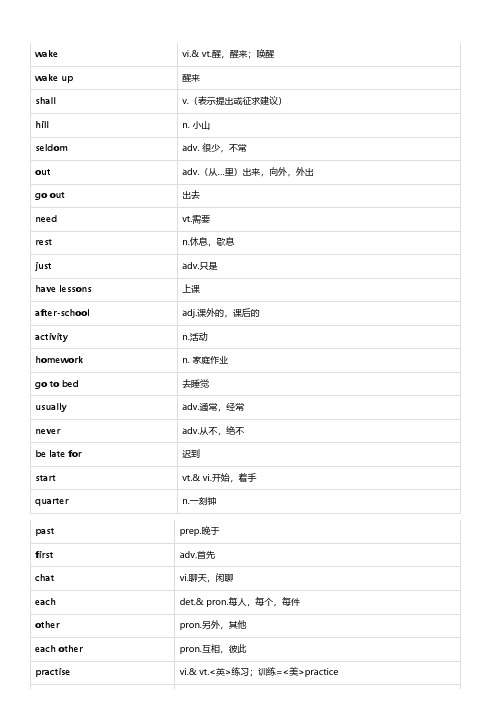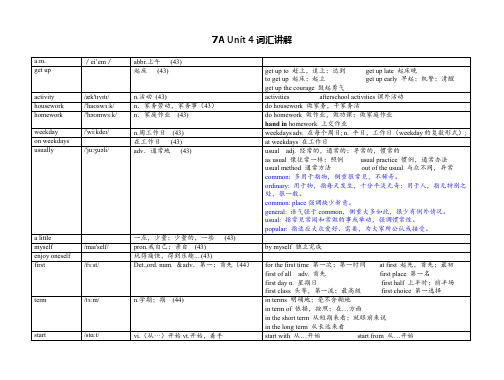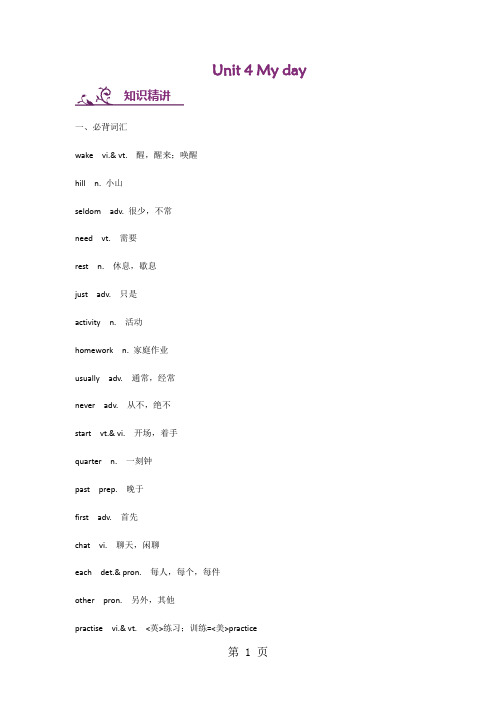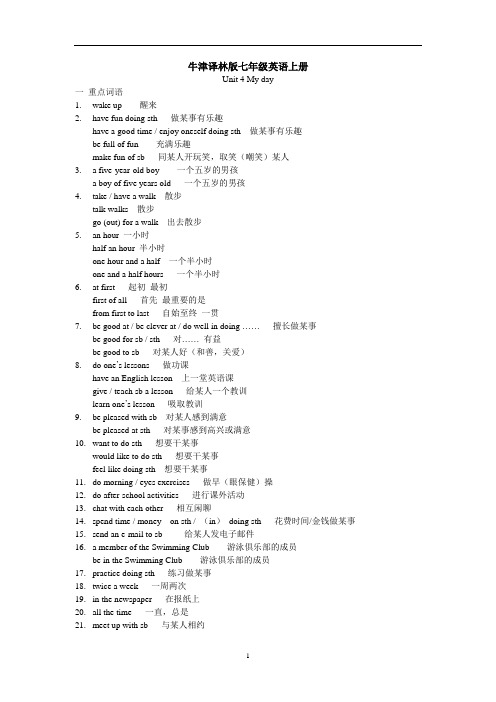译林版英语七年级上册Unit4单词
Unit 4 重点词组 牛津译林版英语七年级上册

7A Unit 41.醒来wake up2.叫醒某人wake sb. up3.到了吃早饭的时间吗?Is it time for breakfast?4.到某人做某事的时候了。
It’s time for sb. to do sth.5.我们去山上散步,好吗?Shall we go walking in the hills?6.出去go out7.吃完早饭后after breakfast8.吃午饭have lunch9.需要好好休息need a good rest10.有些狗就是不知道怎样玩乐。
Some dogs just don’t know how to have fun.11.做某事玩得高兴have fun doing sth.12.喜爱和厌恶之物likes and dislikes13.在右边on the right14.做早操do morning exercises15.上课have lessons16.做课外活动do after-school activities17.上床睡觉go to bed18.迟到be late for19.你们几点开始上课?What time do you start lessons?20.在八点一刻at a quarter past eight21.喜欢上学enjoy school22.给某人写信write to sb.23.她的一封电子邮件one of her emails24.从星期一到星期五,我们学校早上8点开始。
Our school starts at eight in the morning from Monday to Friday.25.我们的课在8点15分开始。
Our lessons begin at 8:15.26.我最喜欢的科目是英语。
(2)My favourite subject is English. / I like English best.27.对某人友好(3)be nice / kind / friendly to sb.28.互相聊天chat with each other29.在操场上(2)in the playground / on the playground30.有一个阅读俱乐部have a Reading Club31.我在校排球队。
苏教译林版初中英语七年级上册 Unit 4 知识汇总

wake vi.& vt.醒,醒来;唤醒wake up醒来shall v.(表示提出或征求建议)hill n. 小山seldom adv. 很少,不常out adv.(从…里)出来,向外,外出go out出去need vt.需要rest n.休息,歇息just adv.只是have lessons上课after-school adj.课外的,课后的activity n.活动homework n. 家庭作业go to bed去睡觉usually adv.通常,经常never adv.从不,绝不be late for迟到start vt.& vi.开始,着手quarter n.一刻钟past prep.晚于first adv.首先chat vi.聊天,闲聊each det.& pron.每人,每个,每件other pron.另外,其他each other pron.互相,彼此practise vi.& vt.<英>练习;训练=<美>practicehave a good time过得愉快,玩得高兴wish n.希望,祝愿 vt.希望,祝愿would modal v.(表示客气地建议或邀请)would like(=\'d like)想,愿意life n.(pl. lives)生活;生命roller skating n.溜旱冰luck n.好运,幸运museum n. 博物馆twice adv.两次picnic n.野餐once adv.一次dislike n.不喜爱,厌恶reason n.原因,理由ready adj.准备好,准备完毕learn vt.& vi.学,学习,学会world n.世界get ready for为…准备好have breakfast吃早饭have lunch吃中饭in the morning在上午in the afternoon在下午in the evening在晚上02U n i t4知识梳理【重点短语】1. wake up 醒来2.wake sb. up 叫醒某人3. It’s time for sth. / It’s time (for sb.) to do sth.是(某人)干某事的时候了4. go walking in the hills 去山上散步5. seldom go out 很少外出6. need a good rest =need to have a good rest需要好好休息7. need to do sth. 需要做某事8. write to her online friend 写信给她的网友9. do morning exercises 做早操10. do eye exercises做眼保健操11. do some exercise 锻炼12. have lessons 上课13. start (begin) lessons 开始上课14. do after-school activities 做课外活动15. be never late for work / school 上班/ 上学从不迟到16. one of ….. …….之一。
Unit4知识点 牛津译林版英语七年级上册

7AU4知识点New words and expressions:1.wake up.He wakes up at six o’clock.1.He wakes her up at seven o’clock.2/Shall we go fishing this afternoon?OK/Good idea! That’s all right. (No,let’s go shopping.3.He seldom goes out.He’s never late for school.4.She has breakfast/lunch/dinner.5.I need to go home early6.have a good rest7.have fun/have a good (great) time (in) doing sth.I have fun playing football8.have lessons/have an English lesson.9.after-school activities10.do one’s homeworkHe does his homework/We do our homework.He doesn’t do his homework./Does he do his homework?11.go to bed. He goes to bed at 9/He gets up at six .12.be late for He is late for school/the meeting.13.The meeting/Our school starts at 8 o’clock.14.a quarter past six/seven half past eight15.at six in th emorning/afternoon16.play football first.17.chat with him/her chat with each other18.learn from each other/ help each other19wish best wishes wish you successWish your team good luck.20.would like to go shopping.Would you like to go shopping this afternoo ?21.save my life---save their lives.22.go to the museum.23twice a week/once a year. How often does he go home?24.go on a picnic=go on picnics25.dislike playing games27.get ready for th eparty/th emeeting.28.learn a lot about the worldLanguage points: 1.It’s time for breakfast=It’s time to have breakfast2.Shall we go running/walking in the hill?3.I seldom go out /play games.4.After sleep I sleep.5.nad a good rest/He needs some milk.6.I don’t know how to have fun/what to do /how to do it/where to go7.What time do you strat lessons?8enjoy myself/enjoy working in Beijing/living in Shanghai.9.talk about playing games.10.from Monday to Friday—five days a week.11.Our lessons begin at 8:15.12.My favourite subject is English/sport is swimming.13.a lot of friends—lots of /many14.They are all nice(kind) to us---All of them are nice to us.15.a Reading Club16.read books/borrow books from the library.17.I also like playing volleyball.18.I’m in the school volleyball team=I’m a member of the school team.19.on Wednesday afternoon20.in the evening/in March/in winter/in 2202/in 2012.321.on Saturday/on 1 July/on Sunday morning/on Children’s Dayon a cold morningo/ on the afternoon of September 122.at seven o’clock/at 6 years old/at Christmas23.Thanks for your e-mail/giving me a pen/helping us with our English.24.tell you about my life/tell us about your school.25.I’m good at playing football=I play footballwell.26.He often plays football in the playground.27.She doesn’t have lunch time to play tennisShe has atime to sing.28.She’s a member of th eswimming team.She usually swims after school.29.He never plays basketball.30.He goes to her dancing lessons.31.She always dances for half an hour.32.She sometimes goes roller skating.33.Saturday ,7 November.34.Welcome to our schol/our school football match.35.There’s a volleyball match between A and B.36.He goes there by bus.37.I hope everyone can come and watch the game.38Wish our team good luck.39.What do you like to do at weekends?40.How often do you visit the Great Wall.Twice a month41.Morning exercises are good fo rus.42.Reading in th esun is bad for your eyes.43.have too much homework to do.44.so I can’t play basketball well.45.It helps me get ready for the day.48.I don’t like singing.49.It’s fun/interesting.。
2024-2025学年牛津译林版七年级英语上册+Unit+4+新版+词汇表讲解

7A Unit 4词汇讲解a.m./ei’em/abbr.上午(43)get up 起床(43)get up to 赶上,追上;达到get up late 起床晚to get up 起床;起立get up early 早起;机警;清醒get up the courage 鼓起勇气activity/æk'tɪvɪtɪ/n.活动(43)activities afterschool activities课外活动housework/'haʊswɜːk/n.家务劳动,家务事(43)do housework 做家务,干家务活homework/'həʊmwɜːk/n.家庭作业(43)do homework 做作业,做功课;做家庭作业hand in homework 上交作业weekday/'wiːkdeɪ/n.周工作日(43)weekdays adv. 在每个周日; n. 平日,工作日((weekday的复数形式); on weekdays 在工作日(43)at weekdays 在工作日usually/'ju:ʒuəli/adv.通常地(43)usual adj. 经常的,通常的;寻常的,惯常的as usual 像往常一样;照例usual practice 惯例,通常办法usual method 通常方法out of the usual 与众不同,异常common: 多用于指物,侧重很常见,不稀奇。
ordinary: 用于物,指每天发生,十分平淡无奇;用于人,指无特别之处,很一般。
common: place强调缺少新意。
general: 语气强于common,侧重大多如此,很少有例外情况。
usual: 指常见常闻和常做的事或举动,强调惯常性。
popular: 指适应大众爱好、需要,为大家所公认或接受。
a little一点,少量;少量的,一些(43)myself/maɪ'self/pron.我自己;亲自(43)by myself 独立完成enjoy oneself玩得痛快,得到乐趣 (43)first/fɜːst/Det.,ord. num. &adv.第一;首先(44)for the first time 第一次;第一时间at first 起先,首先;最初first of all adv. 首先first place 第一名first day n. 星期日first half 上半时;前半场first class 头等,第一流;最高级first choice 第一选择term/tɜːm/n.学期;期(44)in terms 明确地;毫不含糊地in term of 依据,按照;在…方面in the short term 从短期来看;就眼前来说in the long term 从长远来看start /stɑːt/vi.(从···)开始vt.开始,着手start with 从…开始start from 从…开始n.开头,开端(44)at the start 开始at the start of 在…开始的时候start in 开始from the start 从一开始start up v. 开始;发动;突然站起;突然出现start at 开始于…;以…开始;因…吃惊start on v. 开始进行start for 出发,启程;动身去start out 出发;著手进行start off 出发,开始start point 出发点;起始点start doing/ to do sth 开始做某事writer/'raɪtə/n.作家(44)language/ˈlæŋɡwidʒ/n.语言(44)foreign language(s) n. 外语;外文language learning 语言学习second language 第二语言body language 身体语言natural language 自然语言spoken language 口语,口头语言;出声语言common language 共同语;公用语言native language 本国语言;本机语言;机器各单元间编码语言amazing/ə'mezɪŋ/adj.令人大为惊奇的(44)biology/baɪ'ɒlədʒɪ/n.生物学(44)biological adj. 生物学的;生物的living/'lɪvɪŋ/adj.活着的,活的(44)n. 生计;生存;生活living environment 生活环境living room 客厅,起居室living standard 生活水平,生活标准standard of living 生活水平;生活标准living space 生存空间living condition 生活条件;居住环境make a living 谋生,维持生活cost of living 生活费,生活费用for a living 为了生存;为…谋生living thing 生物living level 生活水平earn a living 谋生;活命living habit 生活习惯;生活方式alive: 其反义词为dead,指生命从奄奄一息到精力旺盛的各种状态。
牛津译林版七年级上册英语:Unit 4 My day 词汇与语法基础训练

Unit 4 My day 知识精讲一、必背词汇wake vi.& vt. 醒,醒来;唤醒hill n. 小山seldom adv. 很少,不常need vt. 需要rest n. 休息,歇息just adv. 只是activity n. 活动homework n. 家庭作业usually adv. 通常,经常never adv. 从不,绝不start vt.& vi. 开场,着手quarter n. 一刻钟past prep. 晚于first adv. 首先chat vi. 聊天,闲聊each det.& pron. 每人,每个,每件other pron. 另外,其他practise vi.& vt. <英>练习;训练=<美>practicewish n. 希望,祝愿vt. 希望,祝愿life n. 〔pl. lives〕生活;生命luck n. 好运,幸运museum n. 博物馆twice adv. 两次picnic n. 野餐once adv. 一次dislike n. 不喜欢,厌恶reason n. 原因,理由ready adj. 准备好,准备完毕learn vt.& vi. 学,学习,学会world n. 世界二、重点词汇1. seldom adverb /ˈseldəm/almost never很少;几乎从来没有例句:Now that we have a baby, we seldom get the chance to go to the cinema.有了孩子以后,我们很少有时机看电影了。
We seldom receive any apology when mistakes are made.出错的时候,我们很少听到抱歉的话语。
2. activity noun /ækˈtɪvəti/the situation in which a lot of things are happening or people are moving around活泼;繁忙;热闹例句:There was a lot of activity in preparation for the Queen's visit.大家都在为准备迎接女王来访而繁忙。
新译林版英语七年级(初一)上册Unit 4知识点归纳总结

Thanks for your email. 1. 谢谢你的电子邮件。 2. 我想告诉你我在这里的生活。 I would like to tell you about my life here. 3. 他们多久锻炼一次。 --- How often do they exercise? 他经常在操场踢足球。 --- He usually plays football in the playground. 4. 她多久去上一次舞蹈课? --- How often does she go to her dancing lessons. 她一个星期去上舞蹈课一次/两次。 --- She goes to her dancing lessons once/twice a week.
15. … 迟到 be late for
16. 开始上课 start lessons
17. 在8点15分 at a quarter past eight 18. 在7点45分 at a quarter to eight 19. 在7点半 at half past seven
Reading短语:
1. 从星期一到星期五 from Monday to Friday 2. 擅长做某事 be good at doing sth a lot of= lots of +可数名词/不可数名词 3.许多 many + 可数名词复数 much +不可数名词 许多 4. 对某人友好 be nice/kind/friendly to sb 5. 和某人聊天 chat→chatting chat with sb 6. 相互 each other 7. 或者;否则 or in the playground 8. 在操场
Grammar短语:
牛津译林版七年级英语上册Unit-4单元知识点(重点短语、句型)

牛津译林版七年级英语上册Unit 4 My day一重点词语1.wake up 醒来2.have fun doing sth 做某事有乐趣have a good time / enjoy oneself doing sth 做某事有乐趣be full of fun 充满乐趣make fun of sb 同某人开玩笑,取笑(嘲笑)某人3. a five-year-old boy 一个五岁的男孩a boy of five years old 一个五岁的男孩4.take / have a walk 散步talk walks 散步go (out) for a walk 出去散步5.an hour 一小时half an hour 半小时one hour and a half 一个半小时one and a half hours 一个半小时6.at first 起初最初first of all 首先最重要的是from first to last 自始至终一贯7.be good at / be clever at / do well in doing ……擅长做某事be good for sb / sth 对……有益be good to sb 对某人好(和善,关爱)8.do one’s lessons 做功课have an English lesson 上一堂英语课give / teach sb a lesson 给某人一个教训learn one’s lesson 吸取教训9.be pleased with sb 对某人感到满意be pleased at sth 对某事感到高兴或满意10.want to do sth 想要干某事would like to do sth 想要干某事feel like doing sth 想要干某事11.do morning / eyes exercises 做早(眼保健)操12.do after-school activities 进行课外活动13.chat with each other 相互闲聊14.spend time / money on sth / (in)doing sth 花费时间/金钱做某事15.send an e-mail to sb 给某人发电子邮件16. a member of the Swimming Club 游泳俱乐部的成员be in the Swimming Club 游泳俱乐部的成员17.practice doing sth 练习做某事18.twice a week 一周两次19.in the newspaper 在报纸上20.all the time 一直,总是21.meet up with sb 与某人相约22.know a lot about computers 精通电脑23.go to the dancing lesson 去上舞蹈课24.be busy with / doing sth 忙于做某事25.have much time to do sth 有很多时间做某事26.say hello / goodbye to sb 向某人问好/道别27.go on a study-trip 进行一次学习旅行28.on each side of the street 在街道的每一边29.thank sb for doing sth 感谢某人做某事30.the price for ……。
牛津译林版七年级英语上册Unit4单元知识点总结

牛津译林版七年级英语上册Unit4Welcome to the unit1.Well, after breakfast I want to go to sleep, ...哦,早饭后我想睡觉……(1)after breakfast意为“早饭之后”,after 是介词,“在……之后”。
相关词组:after school放学之后;after class课后;after sb.跟在某人之后(2)go to sleep意为“入睡,睡着”,强调入睡的动作,这里的sleep是名词。
辨析:go to sleep, fall sleep 与go to bed①Go to sleep意为“入睡,睡着”,强调从醒着到熟睡的过程,是自然入睡。
②fall sleep意为“睡着”,强调“突然入睡”的意思。
③go to bed意为“上床睡觉”,强调上床睡觉这个动作,是否睡着不管。
2.You want to keep a diary too. 你也想记日记。
keep a diary 意为“记日记”,一般不用write a diary。
但如果是“做记录”,则可以用。
如:He is writing a diary for teaching. 他正在做教学记录。
Reading1.We always chat with each other or play games.我们总是相互聊天或做游戏。
(1)chat意为“闲谈,聊天”,既可作不及物动词,也可作名词。
作动词后带宾语时必须加介词with辨析:chat with 侧重于“闲聊”,而talk with/to 侧重于“谈话”,有时含有上级对下级,长辈对晚辈谈话的含义。
如:Our English teacher likes talking with us.我们的英语老师喜欢找我们谈话。
(2)each other意为“彼此,相互”,是相互代词,强调两者之间的“相互”,其名词所有格为each other's 。
- 1、下载文档前请自行甄别文档内容的完整性,平台不提供额外的编辑、内容补充、找答案等附加服务。
- 2、"仅部分预览"的文档,不可在线预览部分如存在完整性等问题,可反馈申请退款(可完整预览的文档不适用该条件!)。
- 3、如文档侵犯您的权益,请联系客服反馈,我们会尽快为您处理(人工客服工作时间:9:00-18:30)。
译林版英语七年级上册Unit4单词
wake vt. 守灵,叫醒,醒来 vi. 醒,叫醒 n. 清醒,守护神节日,守灵,尾流,后果
wake up v. 醒来,叫醒
shall aux. 应该;会;将要;必须
hill n. 小山, 小堆, 斜坡 vt. 堆起, 培土
seldom adv. 很少 adj. 很少的
out adj. 外面的,向外的,落伍的,不做考虑的adv. 向外,离岸,外出,出局,出去,用尽,完成,出现,结束 vt. 释放出,结露 vi. 揭发 prep. 向外,通过 n. 外面,在野者,下台者,出局的一击
go out 熄灭,外出, 过时
have breakfast 吃早饭
have lunch 吃午饭
dinner n. 主餐, 晚餐, 晚宴
need n. 需要,必须,缺乏 v. 需要,必需 conj. 需要
rest n.休息;剩余部分;支持物;宁静,安宁 vt.& vi.(使)休息;(使)倚靠[支撑] vi.休息;静止;停止;安心 vt.使休息;使轻松;使长眠;使依赖
just adj. 公正的,公平的,恰当的 adv. 正好,恰好
fun n. 乐趣,玩笑,有趣的人或事物 vi. 开玩笑 adj. 充满乐趣的,令人愉悦的
have lessons 上课
after-school adj. 课外的
activity n. 活动;行动;活跃
homework n. 家庭作业
go to bed 去睡觉
usually adv. 通常
never adv. 从不,绝不
be late for 迟到
start n.开始;动身;开动;起点 vt.& vi.出发,启程 vt.起动;提出(问题);开办;使开始 vi.起始;突然出现;突然跳起;突然涌出
quarter n. 四分之一, 一刻钟, 季度, 25美分 vt. 四等分 vi. 住宿, 驻扎 adj. 四分之一的
past adj. 过去的 adv. 过 n. 过去 prep. 过,经过
in the morning 在上午
in the afternoon 在下午
in the evening 在晚上
first adv. 首先,第一,优先 adj. 第一的, 最早的, 一流的 n. (序数词)第一, 第一个人或事物, (大学学位的)最优等, (汽车, 自行车等的)最低挡chat n. 聊天,闲谈 vt. &vi. 谈天,闲谈
each adj. 每个, 每, 每一 adv. 每个 int. 每个, 个人, 个自
each other pron. 互相, 各自
practise vt. 实践(使...练习, 养成...的习惯)
practice n. 练习, 实行, 习惯; 业务 vt. &vi 练习, 实习, 开业
have a good time 玩得痛快
wish n. 渴望,愿望,(复数)祝颂,命令 vt. &vi. 想要,希望
would aux.将,将要;愿意;会,打算;大概 v.(will 的过去式,用于转述)将
would like 想要 v. 愿意
life n. 生活, 生命, 人生, 生物, 寿命,灵魂, 无期(徒刑) adj. 活的,终身的,生动的
roller n. 滚筒, 滚轴, 滚转机
skate n. 冰鞋 v. 滑冰 vi. 溜冰, 滑冰
roller skating 滑旱冰
luck n. 运气,幸运,吉祥之物 v. 侥幸成功
museum n. 博物馆
twice adv. 两倍, 两次
picnic n. 野餐,愉快的时间,猪脊肉 vi. 野餐
dislike v. 不喜欢,厌恶 vt.&n. 不喜爱,厌恶
reason n. 理由,原因,理智,理性 vt. 说服,总结 vi. 规劝,下判断ready adj. 准备好的,乐意的,情愿的,现成的 vt. 做好…的准备learn vt. 学习,获悉 vi. 了解,习得
world n. 世界(人),领域,俗世。
